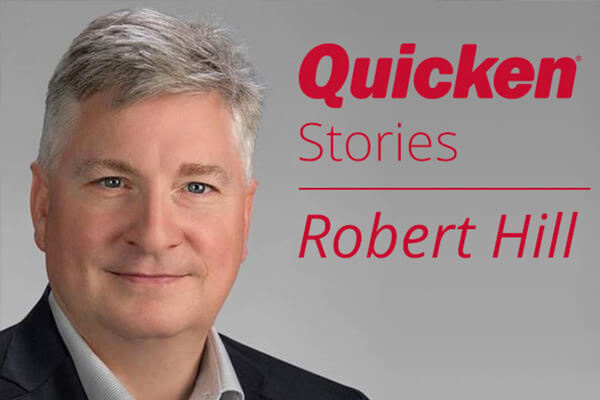Quicken Stories: Robert Hill, COO
Robert Hill started his career as an entry-level software engineer. Today, he’s the COO of a med-tech firm and a father of five. According to Robert, Quicken has been an integral part of helping him provide for his family. Read his Quicken story to learn how planning, tracking, and actively managing your finances can help you grow your net worth and support your life goals.
Humble beginnings
“I grew up in West Virginia. The way I describe it is you go to the end of the world and move back three feet. That’s where I grew up. There is tremendous natural beauty there and wonderful people, but it can be a difficult place to start a career in high-tech fields.“
When it came to personal finance, Robert had to learn everything on his own—including how to write checks and reconcile a bank account.
It took me years to learn what I know about financial literacy, and it’s a never-ending process. I still spend time every week researching new investments, new ways to approach things, and how to optimize my financial life. Accounting is an incredibly complex thing that I think people need to understand.
How did Robert emerge from his small-town childhood to become a COO, supporting a family of seven with a variety of investments in an extensive personal portfolio? One step at a time, and with a little help from Quicken.
Discovering his passion
“I’m obsessed with helping cancer patients—improving their lives and finding new ways to treat the disease.“
Thanks to a lot of hard work, Robert was able to study computer science and engineering at Carnegie Mellon. There, he met an entrepreneurial professor who had started a medical company that was working on cancer treatments with radiation therapy.
Robert joined the team as an intern, working part-time as he completed his education, and started full-time upon graduation as an entry-level software engineer. He went on to spend his entire career in the field of cancer treatment.
“That company did amazing things,” he told us.“The technique that we pioneered will treat over a million cancer patients this year. It was an incredible, life-changing experience. I’m grateful that I got to be a part of that.”
Personal finance: the early years
I used to tell my friends, ‘I really don’t care about money. Money doesn’t mean anything to me.’
Having grown up in a relatively poor region of West Virginia, Robert felt like he was on top of the world. When he got married, money was no object to the young couple.
“My wife also entered the workforce,” said Robert, “so we were dual income, no kids, in our early 20s. The world was our oyster.”
That changed a few years later, in 1997, when they started to feel more financial pressure. They had their first child. They had 2 car payments. They wanted to buy a home.
“We were on our own financially, trying to navigate the challenges of life—the crazy, one-time expenses that come up when cars break down … just the normal aspects of life.“
It was around that time that Robert discovered Quicken.
“I installed it on my computer at home,” he said, “and I began to develop an appreciation for what net worth meant. Before then, I was really focused on day-to-day cash flow. I didn’t have much savings. I didn’t have any investments. So, I really wasn’t thinking in terms of net worth.”
From cash flow to assets & liabilities
“I came to understand that financial life was more than just managing monthly cash flow. There was suddenly a purpose behind it, where it was about storing up resources for the future and to protect against the unknown.“
Robert and his wife wanted to buy a home, but they were both still paying off large student loans. Quicken helped them think about managing that debt, and the way different assets changed in value over time.
Entering things like student loans and car loans into Quicken as separate accounts helped him broaden his financial perspective.
What became clear was that the cash-flow model that I had run my life on up until that point was an insufficient way to think about your financial life. I had to recognize that there were assets and liabilities that you purchase, create, or borrow money against, and your financial life is also about dealing with those things in addition to the cash-flow needs of the moment.
From assets & liabilities to net worth
“My wife left the workforce, and at the time our salaries were not very different from each other. So, I arrived at a place where I woke up one day, and I had half the income that I had the day before. I still had all the debt and all the liabilities, but I had half the income. That was a very scary time.“
As their family grew, so did their financial needs. Robert continued to pay attention to his monthly cash flow, especially once his wife left the workforce. At the same time, he started paying closer attention to assets and liabilities, realizing that not all assets are equal.
Given his new financial situation, Robert realized he was facing a significant challenge. He had come to a critical crossroads in his personal financial journey.
“There was a time somewhere in the late ’90s when a light switch flipped,” Robert said, “and I realized that the goal wasn’t to keep a positive cash flow for the month. The goal was to maximize my net worth over time. It was a daunting perspective because I thought I was doing well financially, but as I added more assets and liabilities, I began to realize that my net worth was, in fact, negative. And when your net worth is negative, it’s difficult to feel good about where you’re at financially.”
From negative to positive: the path to financial security
“There was only one way out of that: to build a positive net worth. Indeed, I needed enough of a positive net worth to weather the storms that life might throw at us.“
The first step to solving any problem lies in recognizing and understanding the problem itself. With his new perspective, Robert knew immediately what he needed to do.
If you’re going to be a self-made person, there’s only one path to make that happen, and that’s to make more money than you spend. To do that, you have to either increase your income or cut your spending, but cutting your spending is really hard. Most things don’t get less expensive over time. They get more expensive over time.
With liabilities like student debt and a mortgage, cutting your spending can be even harder. So, Robert decided to tackle the problem by doing more to raise his income.
“It created a sense of hunger in me,” he said. “I started to negotiate for my compensation. I started to seek out promotions. Feeling that scarcity provoked me to change how I approached things. To be willing to accept more difficult assignments at work. To take on new things, try new things, take risks.”
At the same time, he also minimized large purchases and started keeping vehicles longer.
“If you can keep increasing your compensation each year while keeping your payments fixed, like your car and house payment, that makes a big difference. Eventually, I was able to negotiate a large compensation increase as I moved up to vice-president for the first time. These compensation increases really helped as I began to push myself harder financially, so within a few years of starting to use Quicken, my net worth turned from negative to positive.“
Robert was quick to point out that this wasn’t always an easy road, and they encountered plenty of setbacks along the way. The key, he says, is to stick with it.
“Many years, we struggled. Many years, at the end of the day, our net worth shrank. But, over time, I was able to build up investment assets.“
Financial habits that made the difference
We asked Robert what financial habits have made the most difference in building a positive net worth. Here’s what he told us:
1. Driving vehicles longer
“I started driving cars until they were 10 years old because I saw what it did to my cash flow and net worth when I went out and bought a new one.”
2. Investing & maxing out 401(k) contributions
Robert focused on investments as soon as he could. As his income grew, he started maxing out his 401(k) contributions as well as purchasing real estate, stocks, and mutual funds.
3. Updating his financial accounts daily
“In my case, I update my financial accounts almost every day. I don’t use any kind of checkbook register, so Quicken lets me plan my cash flow.”
4. Setting a minimum account balance
“One of the things I did was to define a target minimum balance for my checking account. In a big family, it can be hard to know exactly what money might be going out when, so I maintain that buffer level to make sure we have the cash we need.”
5. Watching those recurring expenses
“Businesses don’t talk about spending $25,000 on a car. They talk about spending $327 per month. If businesses are applying that pressure and using that technique, consumers need to pay attention to what that’s doing to them financially.”
6. Increasing his income without increasing expenses
“For most people, their income will grow over time. If they can just find a way to hold their expenses while that income grows, over the course of a lifetime that makes a big difference.”
We’d like to thank Robert for taking the time to speak with us and share his history with Quicken.
We believe every Quicken customer has a unique story to share. If you have a Quicken story, we’d love to hear more about how you use Quicken and your favorite tips and tricks.
If you’re interested in participating in an interview, please contact us at interviews@quicken.com. Selected stories will be featured on our blog post and social media and will receive a special gift from the Quicken team. We look forward to hearing your story.
Quicken has made the material on this blog available for informational purposes only. Use of this website constitutes agreement to our Terms of Use and Privacy Policy. Quicken does not offer advisory or brokerage services, does not recommend the purchase or sale of any particular securities or other investments, and does not offer tax advice. For any such advice, please consult a professional.
About the Author
Quicken
Our mission is to help our customers lead healthy financial lives.



